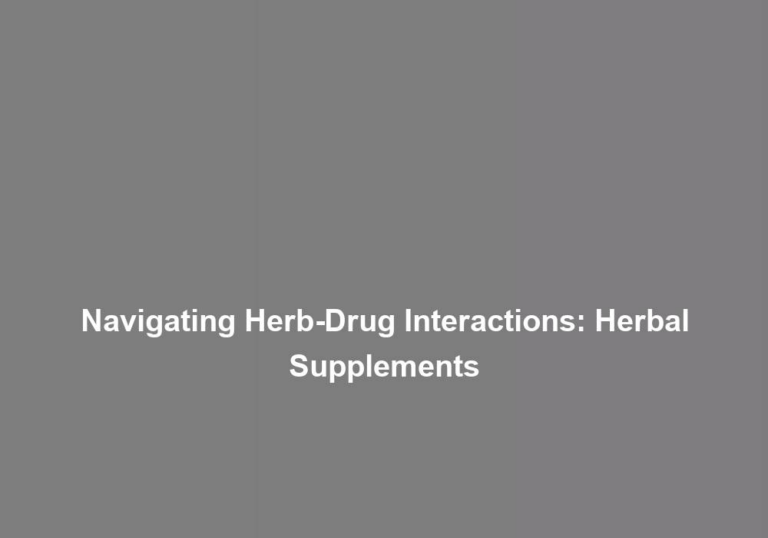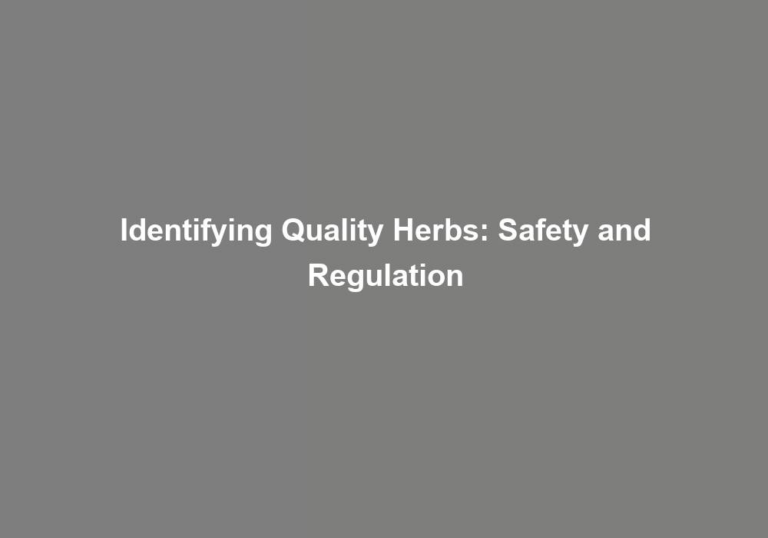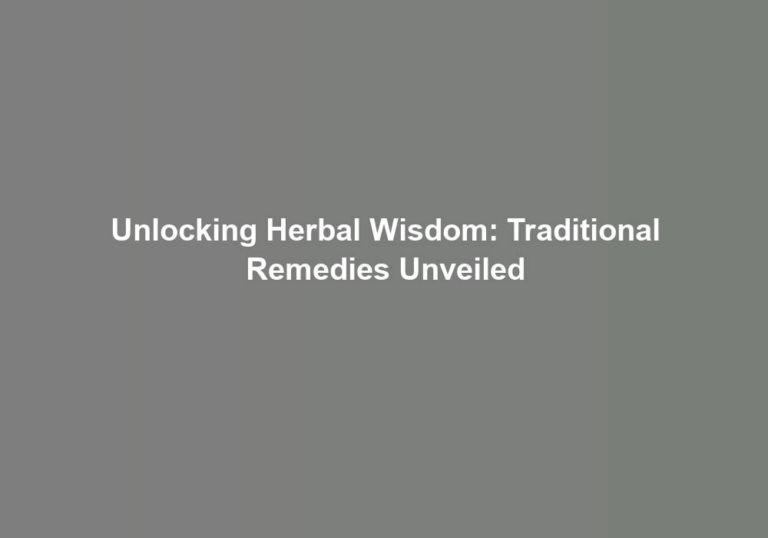Safety First: Understanding Herb-Drug Interactions
When it comes to managing your health, navigating herb-drug interactions is like walking through a complex maze G?? it requires caution and attention to detail. Understanding how herbs and drugs can interact is crucial for your well-being, yet itG??s a topic that often gets overlooked. But did you know that certain herbs can interact with medications, potentially causing adverse effects or reducing the effectiveness of your prescribed treatment? ItG??s a matter that demands your attention, and in the following discussion, youG??ll gain insights into the common interactions, risk factors to consider, and strategies for managing herb-drug interactions effectively.
Importance of Herb-Drug Interactions
Understanding the importance of herb-drug interactions is crucial for ensuring the safety and efficacy of your medication regimen. Mixing herbs with certain medications can have implications that may pose potential dangers to your health. For example, St.-?JohnG??s Wort, a commonly used herbal supplement for depression, can interact with various medications, including antidepressants, birth control pills, and blood thinners. Such interactions can lead to reduced drug efficacy or increased risk of side effects, emphasizing the need for preventive measures.
Patient education plays a pivotal role in mitigating the risks associated with herb-drug interactions. By being informed about potential interactions, you can actively engage in discussions with healthcare providers to make well-informed decisions regarding your treatment. ItG??s essential to disclose all herbs, supplements, and medications you are taking to your healthcare team to ensure comprehensive and personalized care.
Moreover, understanding the implications of herb-drug interactions empowers you to take proactive measures to prevent adverse effects. This can include researching potential interactions before starting a new herb or supplement, consulting with a healthcare professional, and being vigilant for any unusual symptoms when starting a new medication or supplement regimen.
Common Herb-Drug Interactions
To safeguard your health and medication regimen, being aware of common herb-drug interactions is essential for making informed choices about your healthcare. ItG??s important to understand that certain natural remedies can interact with prescription medications, potentially leading to adverse effects. Here are some common herb-drug interactions to be mindful of:
-
St.-?JohnG??s Wort and Antidepressants: St.-?JohnG??s Wort, often used for mood support, can interact with antidepressants, reducing their effectiveness and leading to a relapse of depressive symptoms.
-
Ginkgo Biloba and Blood Thinners: Ginkgo biloba, popular for cognitive enhancement, can increase the risk of bleeding when taken with blood-thinning medications like warfarin or aspirin.
-
Garlic and Anticoagulants: Garlic supplements, known for their potential cardiovascular benefits, can amplify the effects of anticoagulant medications, resulting in an increased risk of bleeding.
-
Echinacea and Immunosuppressants: Echinacea, commonly used for immune system support, may interfere with the effectiveness of immunosuppressant drugs prescribed to prevent organ rejection after a transplant.
Being aware of these potential dangers is crucial in ensuring the safe and effective use of both herbal remedies and prescription medications. Always consult with your healthcare provider before starting any new herbal supplement, especially if you are currently taking prescription medications. This proactive approach can help prevent herb-drug interactions and promote your overall well-being.
Risk Factors to Consider
Consider your individual health history and current medication regimen when evaluating the risk factors associated with herb-drug interactions. Patient education plays a crucial role in understanding these risk factors. ItG??s important to be aware of your medical history, including any chronic conditions, allergies, or previous adverse reactions to medications. Additionally, take into account your current medication regimen, including prescription drugs, over-the-counter medications, and any herbal supplements you may be taking. Certain health conditions and medications can increase the likelihood of herb-drug interactions, making it essential to communicate openly with your healthcare provider.
Healthcare provider communication is key in managing the risk factors related to herb-drug interactions. Your healthcare provider can offer valuable insights into potential interactions and provide personalized recommendations based on your health status. Make sure to inform your healthcare provider about all the medications and supplements you are taking, including herbal products. This open dialogue can help in identifying and mitigating potential risks associated with herb-drug interactions. Furthermore, your healthcare provider can help you understand the potential side effects and interactions, empowering you to make informed decisions about your health.
Managing Herb-Drug Interactions
When managing herb-drug interactions, consult with a qualified healthcare professional to ensure the safe and effective use of both herbs and medications. Managing risks associated with herb-drug interactions requires a proactive approach and effective communication strategies. Here are four key steps to help you manage herb-drug interactions safely:
-
Open Communication: Establish open and honest communication with your healthcare provider about all the herbs, supplements, and medications you are currently using. This includes disclosing any changes in your herbal or medication regimen.
-
Risk Assessment: Work with your healthcare provider to assess the potential risks and benefits of combining herbs and drugs. Factors such as dosage, frequency, and individual health conditions should be carefully considered.
-
Monitoring: Regular monitoring and follow-up appointments with your healthcare provider are crucial when managing herb-drug interactions. This allows for the evaluation of any potential side effects or changes in the effectiveness of medications.
-
Education and Resources: Seek reliable sources of information about herb-drug interactions. Your healthcare provider can provide educational materials and reputable websites to help you make informed decisions.
Seeking Professional Guidance
Seek professional guidance from a qualified healthcare provider familiar with herb-drug interactions to ensure the safe and effective use of both herbs and medications. A healthcare provider such as a doctor, pharmacist, or a registered dietitian can offer expert advice tailored to your specific health needs. When seeking professional guidance, itG??s important to consult with someone who is knowledgeable about both conventional medications and herbal supplements. This ensures that they can provide comprehensive recommendations that take into account potential interactions between herbs and drugs.
When seeking professional guidance, itG??s crucial to rely on reputable sources of information. Look for healthcare providers who stay updated with the latest research and guidelines regarding herb-drug interactions. Reputable sources may include healthcare professionals who have specialized training in integrative medicine, pharmacists with expertise in natural supplements, or doctors who are open to discussing complementary and alternative therapies.
Expert advice from a qualified healthcare provider can help you navigate the complexities of herb-drug interactions. They can provide personalized recommendations based on your medical history, current medications, and the specific herbs or supplements you are considering. By seeking professional guidance, you can make informed decisions about incorporating herbs into your healthcare regimen while minimizing the risk of potential interactions with your medications. Remember, your healthcare provider is there to support you in making safe and well-informed choices regarding the use of herbs and medications.
Conclusion
Remember, just like in a dance, safety comes first when it comes to herb-drug interactions. By understanding the potential risks and taking appropriate precautions, you can ensure a harmonious and balanced approach to your health and wellness. Always seek professional guidance and stay informed about the potential interactions between herbs and drugs to avoid any unwanted side effects. Your health is a delicate dance, so make sure to lead with caution and care.







